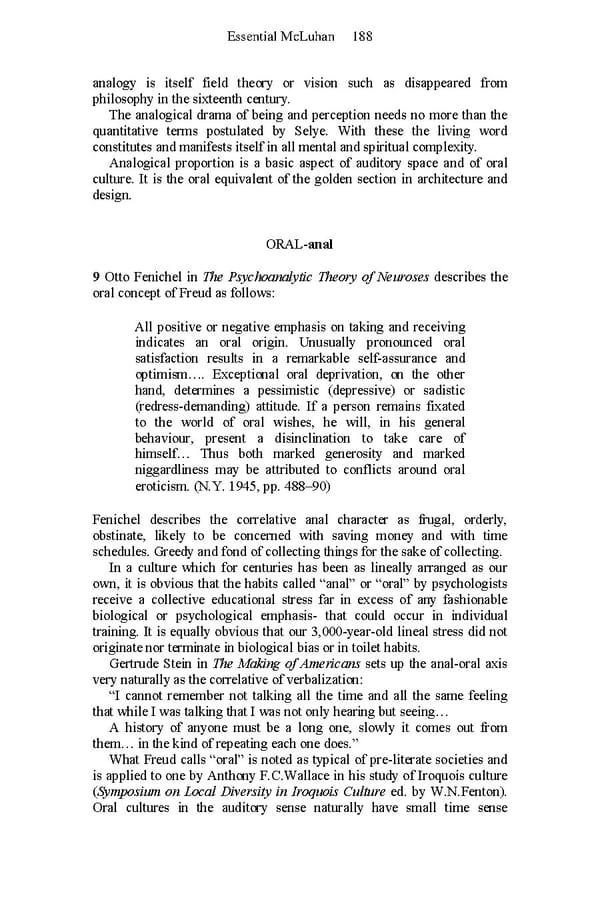Essential McLuhan 188 analogy is itself field theory or vision such as disappeared from philosophy in the sixteenth century. The analogical drama of being and perception needs no more than the quantitative terms postulated by Selye. With these the living word constitutes and manifests itself in all mental and spiritual complexity. Analogical proportion is a basic aspect of auditory space and of oral culture. It is the oral equivalent of the golden section in architecture and design. ORAL-anal 9 Otto Fenichel in The Psychoanalytic Theory of Neuroses describes the oral concept of Freud as follows: All positive or negative emphasis on taking and receiving indicates an oral origin. Unusually pronounced oral satisfaction results in a remarkable self-assurance and optimism…. Exceptional oral deprivation, on the other hand, determines a pessimistic (depressive) or sadistic (redress-demanding) attitude. If a person remains fixated to the world of oral wishes, he will, in his general behaviour, present a disinclination to take care of himself… Thus both marked generosity and marked niggardliness may be attributed to conflicts around oral eroticism. (N.Y. 1945, pp. 488–90) Fenichel describes the correlative anal character as frugal, orderly, obstinate, likely to be concerned with saving money and with time schedules. Greedy and fond of collecting things for the sake of collecting. In a culture which for centuries has been as lineally arranged as our own, it is obvious that the habits called “anal” or “oral” by psychologists receive a collective educational stress far in excess of any fashionable biological or psychological emphasis- that could occur in individual training. It is equally obvious that our 3,000-year-old lineal stress did not originate nor terminate in biological bias or in toilet habits. Gertrude Stein in The Making of Americans sets up the anal-oral axis very naturally as the correlative of verbalization: “I cannot remember not talking all the time and all the same feeling that while I was talking that I was not only hearing but seeing… A history of anyone must be a long one, slowly it comes out from them… in the kind of repeating each one does.” What Freud calls “oral” is noted as typical of pre-literate societies and is applied to one by Anthony F.C.Wallace in his study of Iroquois culture (Symposium on Local Diversity in Iroquois Culture ed. by W.N.Fenton). Oral cultures in the auditory sense naturally have small time sense
 Essential McLuhan Page 194 Page 196
Essential McLuhan Page 194 Page 196